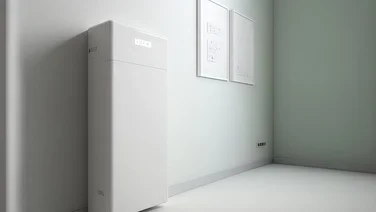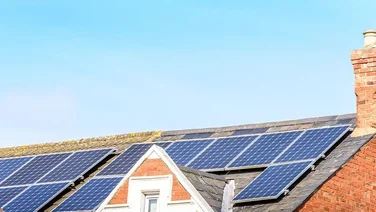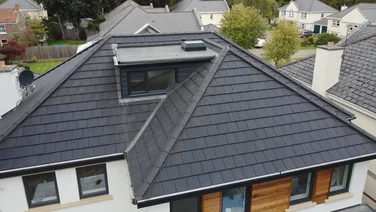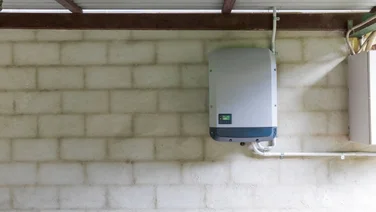We receive a small fee from trusted installers when you request a quote through our site. This helps us keep our content independent, well-researched and up to date – Learn more
- Solar panels reduce your bill by generating free electricity, so you import less power from the grid
- You can sell any surplus energy back to the grid through the Smart Export Guarantee (SEG) scheme
- Your solar panels’ energy production can usually be tracked using an app

Despite the high upfront cost of solar panels, investing in this technology can save you money by providing your home with free, green energy – which of course affects your electricity bills.
In this guide, we’ll tell you how the solar energy you produce shows up on your electricity bills, how it changes your payments, and when you need to tell your energy supplier about your panels.
If you’re ready to start benefiting from solar energy, you can easily compare solar panel prices with our help. Just provide a few quick details, and our expert installers will be in touch with free quotes for you to compare.
Where do you want to install solar panels?
Get startedHow do solar panels affect your electricity bill?
Solar panels will reduce the amount of energy used on your electricity bill.
Your electricity supplier won’t tell you how much solar energy you’ve used in any given month – the overall amount of electricity you’ve used will simply go down.
So the electricity bill that comes after your solar panels are installed will be lower without explaining why – but you’ll know it’s down to your solar installation.
If your solar panels produce electricity you don’t use – as the great majority of panels do – you can sign up to a Smart Export Guarantee (SEG) tariff and sell your excess solar energy back to the grid.
If you use an SEG tariff from the same energy supplier that provides your electricity, your bill will include a line telling you how much money you’ve made by selling your extra solar energy.
The average three-bedroom household with solar panels can increase its savings by 16% by signing up to an SEG tariff.

Are you paying too much for energy?
Compare and switch energy suppliers today with our energy comparison tool – powered by The Energy Shop.
Do you need to tell your energy supplier you have solar panels?
You don’t need to tell your energy supplier that you have solar panels – unless you want to use its SEG tariff.
There’s no other reason to let your energy supplier know – and if you choose a different company’s export tariff, as is your right, you only need to tell that company.
However, your Distribution Network Operator (DNO) – the company that controls the hardware providing your area with electricity – does need to know, assuming your solar installation is connected to the grid.
This is so your DNO knows how much electricity is feeding into the grid, allowing it to manage the network effectively.
Your solar installer should notify the DNO within 28 days of your solar panel installation being commissioned, which is when it’s tested and inspected to ensure it’s functioning safely before you start generating electricity.
After 28 days, check that your installer has sent the relevant commissioning paperwork to your DNO, and if they haven’t, nag them until they do.
If your solar panels were purchased by a previous owner and the installer has since gone out of business, you can contact the DNO yourself to get the system approved.
Will solar panels cover your electricity bill?
Your solar panels almost certainly won’t cover your entire electricity bill.
For at least half the year, a properly sized solar installation will supply enough electricity to cover the average household’s usage during the day – but the sun doesn’t shine at night.
A typical home with solar panels uses 50% of the energy it generates. If you sell the rest through an export scheme, you can cut your electricity bill by more than 60%.
So you won’t cover all your electricity costs – but you’ll usually break even less than halfway through its lifespan.
Even with one of the best solar batteries, you’ll typically only use 80% of the solar energy produced by your panels – and your break-even point will be about a decade more.
It’s important to also take into account how to finance your solar installation as it will impact when you break even.
With enough solar panels and batteries, it’s possible to cover your entire electricity bill, but it’s not cost-effective.

What’s the average electricity bill with solar panels in the UK?
The average electricity bill for a three-bedroom household with a 3.5 kWp system is £236 per year.
This represents a 70% saving on the amount the same home would pay for electricity without solar panels.
For more information, read our page that answers the question: are solar panels worth it in the UK?
Summary
You now have all the knowledge you need about how solar panels interact with your electricity bill.
The next step is to get quotes for your own panels.
Just provide a few quick details about your property, and we’ll put you in touch with our expert solar suppliers, who will provide you with quotes to compare.
FAQs
Where do solar panels connect to my house?
Solar panels usually connect to your house’s electricity supply through the roof, into the top floor of your home.
Your installer will run wires from the solar panels to an inverter, which usually sits in the loft – though feel free to ask for a different position if you’d prefer.
The installer will then connect the inverter to your consumer unit, also known as a fuse board or fuse box.
As soon as your installer has finished their safety checks and made sure the system works, you’re good to go.
Can I change energy suppliers if I have solar panels?
Yes, you can change energy suppliers if you have solar panels.
You don’t have to tell either supplier, and the switch won’t even affect the payments you receive for exporting your excess solar energy – unless you want to get your new supplier’s export tariff too.
If your new provider offers a special export rate to customers who also use its import tariff, you may want to take advantage.
Why is my electricity bill so high when I have solar panels?
If your electricity bill doesn’t fall by much after getting solar panels installed, you may need to get more panels added to your system.
You could also try to run electric items like your dishwasher or washing machine during the day, when possible.
The more of your electricity usage you shift from night to daytime, the more solar energy you’ll use – and the more money you’ll save.
How much can I get for selling electricity back to the grid?
If you’re an Octopus import customer, you can receive around 24p per kWh for selling electricity back to the grid through Octopus Flux. That adds up to £317 per year for the average three-bedroom household.
If you’re not with Octopus, you can sign up to Scottish Power’s SmartGen tariff, which offers 12p per kWh – enough for the typical three-bedroom home to make £159 per year.
This is all thanks to the Smart Export Guarantee, a government-backed initiative that forces big energy suppliers to pay homeowners for any renewable energy they send to the grid.







